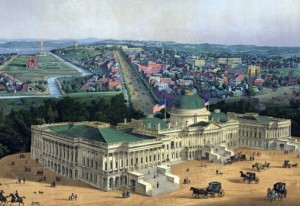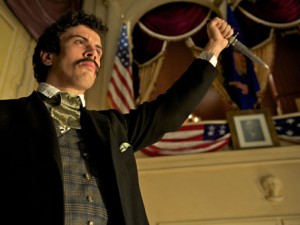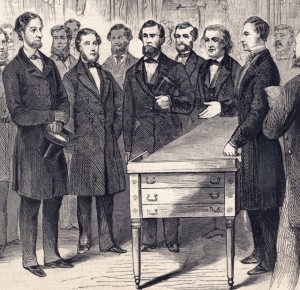 One hundred fifty years ago today William P. Willey wrote his father to update him on the conditions in Carlisle and at Dickinson College. Willey, who was from western Virgina, was one of the few southern students at Dickinson College who did not return home after the attack on Fort Sumter and President Abraham Lincoln’s call for 75,000 troops. While at one point “Southern students…could not walk the streets [in Carlisle] without being harassed with threats and nicknames,” Willey reassured his father there was “nothing to fear.” Willey reported that “several of the best citizens” had told him that “[he] would not be molested.” “I feel just as safe as if I were at home,” as Willey concluded. Willey also believed it was in his best interest to stay since classes at Dickinson would continue. While “only about twenty [students were] left,” Willey explained that Dickinson College President Herman Johnson “[had] sent printed circulars to the parents” in an attempt to convince others to return. Even though “it [was] very lonesome” on campus, Willey noted that “the advantages for those remaining will only be better.” In addition, Willey described how some Carlisle residents reacted to the start of the war. “The prominent desire seems to be… getting a hold on Jeff Davis” and, as Willey noted, “each man declares his intention of preserving an extra shot for him.” Willey also described the reaction on April 22 when reports about an advancing “southern army” reached Carlisle:
One hundred fifty years ago today William P. Willey wrote his father to update him on the conditions in Carlisle and at Dickinson College. Willey, who was from western Virgina, was one of the few southern students at Dickinson College who did not return home after the attack on Fort Sumter and President Abraham Lincoln’s call for 75,000 troops. While at one point “Southern students…could not walk the streets [in Carlisle] without being harassed with threats and nicknames,” Willey reassured his father there was “nothing to fear.” Willey reported that “several of the best citizens” had told him that “[he] would not be molested.” “I feel just as safe as if I were at home,” as Willey concluded. Willey also believed it was in his best interest to stay since classes at Dickinson would continue. While “only about twenty [students were] left,” Willey explained that Dickinson College President Herman Johnson “[had] sent printed circulars to the parents” in an attempt to convince others to return. Even though “it [was] very lonesome” on campus, Willey noted that “the advantages for those remaining will only be better.” In addition, Willey described how some Carlisle residents reacted to the start of the war. “The prominent desire seems to be… getting a hold on Jeff Davis” and, as Willey noted, “each man declares his intention of preserving an extra shot for him.” Willey also described the reaction on April 22 when reports about an advancing “southern army” reached Carlisle:
On Monday night about 2 o’clock the report came that a southern army was marching in this direction, that they had burned Hanover, [Mount Holly Springs], and other small places beyond here, and were coming to Carlisle to take possession of the barracks, and burn the town. In about an hour the streets were alive with people. Women half dressed running through the streets with their children, men with their arms, asking the direction of the army, and before long the country people began to come with butcher knives and rusty shot guns, and I believe some of the Dutch women were clinging to the immortal broomstick. All the bells in town were ringing their loudest peal. Two persons have not yet recovered from the effects of the excitement. It was altogether the most exciting and ludicrous scene I ever saw. A few sensible citizens finally succeeded in showing the absurdity of the report and quiet was restored.
Willey was careful to remind his father that “the excitement here [in Carlisle had] abated to a considerable degree” since that event.You can listen to this letter by clicking on the play button below:
Listen to William Willey’s letter:
















